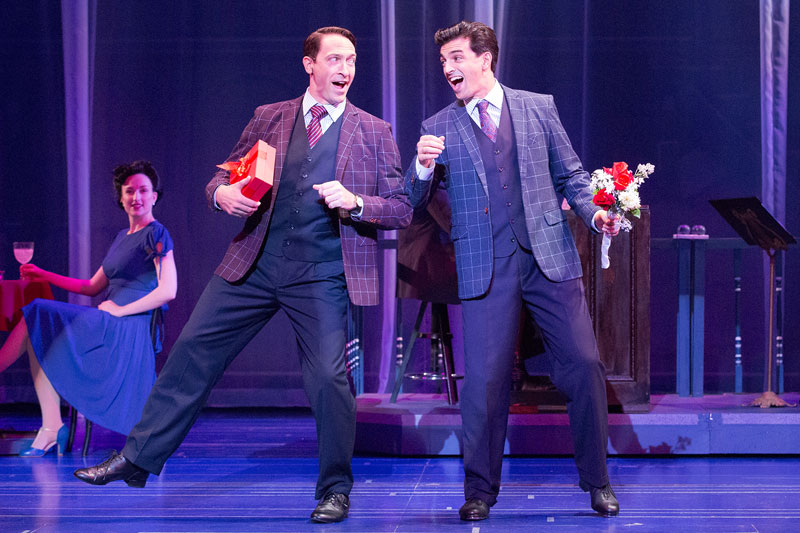
A year before I planned my visit to Germany, I conducted a Facebook search on Wuppertal, my hometown—birthplace of Friedrich Engels and of Germany’s much talked about ballet, the Pina Bausch Tanztheater. Searching through all the folks listed, I discovered Elke Brackmann, a high school teacher of English and an Oxfordian, whose many comments on Shakespeare intrigued me.
We became friends, and Elke and her husband hosted me in Wuppertal last May. In return, I invited her to visit me in Philadelphia. When I asked her what she would like to see on her first visit to the U.S., she wrote: “Visit the balcony where the Declaration of Independence was read out and anything else that you recommend in Philly. Visit the Holocaust Museum in Washington, D.C., MoMA and Ellis Island with the Statue of Liberty in New York, and anything about the American way of life.”
For me, “the American way of life” and its diverging ideologies come alive strongly on the stages of theater in Philadelphia. As Elke’s visit took place during the week of August 6-12, all major theaters had closed, leaving Philadelphia to the tourists. However, I promised her to share some of my impressions about two the latest American stage productions. Below, my letter to Elke, whose European perspective had made her both intrigued and skeptical about the opposing forces in the U.S.:

Dear Elke,
Do you remember when we passed the Walnut Street Theatre (WST), America’s oldest running theater since 1809—presenting lavish Broadway productions—with the world’s largest subscriber base of over 100,000 members? Well, their first main show this season introduced us to Irving Berlin’s HOLIDAY INN, a musical based on the 1942 film of the same name, starring Bing Crosby and Fred Astaire.
In a way, this modern Cinderella story, stitched together by the songs of Berlin, a Russian immigrant who had become a U.S. citizen, soothed the shock that America experienced with the Japanese attack on Pearl Harbor on December 7, 1941. HOLIDAY INN became Hollywood’s consolation prize, a kind of musical bandage to stop the pain of having been attacked by a foreign power—for the first time in its modern history.
During those stressful days, Americans wanted to see their own traditions being preserved and presented on stage, including the main holidays—from the Fourth of July, Thanksgiving, and Christmas all the way to Valentine’s Day and the Easter Parade. Theatergoers wanted to laugh and see hope come alive—however unrealistic the chances. Today’s daily dangling of millions of dollars in front of the population, buying a lottery ticket to become a multi-millionaire overnight, is basically the capitalist counterpart to the old Cinderella story—buying the chance to make it big, rather than a poor girl waiting for some powerful prince to make her life better.
HOLIDAY INN tells the story of an old, neglected farm being turned into an entertainment venue for locals, open only on public holidays. When a young female teacher (Cary Michele Miller) in the little town falls in love with Jim Hardy (Ben Dibble), a former actor who tries to revive the farm, she gets the chance to perform not only at his run-down Holiday Inn in the country, but actually meet Prince Charming, a handsome young singer (Jacob Tischler) who sweeps her away with a contract in Hollywood. However, the idealistic young entrepreneur who turned the old estate around follows her, and she has to make a big decision.
The famous WST went all out with a great cast and creative team—stage design, lighting, fantastic outfits, ‘n all. In Disney-like fashion, the script of Gordon Greenberg and Chad Hodge, based on the old movie, guaranteed a happy end, while people around me laughed, fought tears at times, and hummed along to famous songs like “White Christmas,” “Easter Parade,” and “Cheek to Cheek.”
As expected, the audience responded with a standing ovation. Some of them even wrote comments on WST’s “Customer Review” website. Celeste Mayer from Quakertown, Pennsylvania, representative of many of the reviews, gave the show a 5.0 star rating:
“I was bedazzled by the costumes, the acting, the songs and singing, the dancing, and the energy of the actors/actresses. I was singing those songs all the way home. The theater is very cozy and every seat is a good seat. The area is full of nice restaurants, and we picked Maggiano’s. Since we were going to the Walnut Street Theater, they graciously gave us 15% off our bill! It was my first time at this theater, and I would not hesitate to recommend it to everyone. I can’t wait for the next play!”
“YES THE SHOW IS OLD BUT DID YOU SEE THE AUDIENCE?” asked ETL from West Chester, PA: “I saw a 2 PM show this past Saturday with my wife. If you can ask an extremely talented young cast to do justice to an 80-year-old story and do it better than good, then bravo. As far as the title of my review, it stems from being in our 60’s and still being two of the youngest in attendance for the show.”
Philadelphia theater critic Naomi Orwin wrote: “This is what Walnut Street Theatre does so well—create a feel good musical experience that lets the audience leave the theater humming. The story, about a performer who only wants to live quietly on a farm with the girl he loves, deals with issues like betrayal and alcoholism and foreclosure with a smile, and doesn’t care to look too deeply into the characters’ lives and motives. It has production numbers, including a jump rope dance, that has the audience cheering, and it makes one long for a kinder, gentler time when a rivalry between a singer and a dancer seemed to matter.”
Elke, you probably would have enjoyed the glamorous, Hollywood-esque parts on a simple farm, with two of our popular stars, Ben Dibble as Jim Hardy, the bungling actor in love, and Mary Martello as his delightfully scheming housekeeper and matchmaker, and a festively dressed audience reliving times that none of us ever had—somewhat like sucking on a delicious, chocolate-covered bonbon, but forgetting most of it once it has melted away.
 However, I have a strong sense that you would have liked even more SWEAT, the thought-provoking drama by Lynn Nottage in a production of the Philadelphia Theatre Company, directed by Justin Emeka at the Suzanne Roberts Theatre, named after a popular Philadelphia theater actress and TV host, mother of the billionaire Roberts family, which owns Comcast, “the second-largest broadcasting and cable television company in the world,” and “the largest cable TV company and largest home Internet service provider in the United States,” according to my old friend Wiki.
However, I have a strong sense that you would have liked even more SWEAT, the thought-provoking drama by Lynn Nottage in a production of the Philadelphia Theatre Company, directed by Justin Emeka at the Suzanne Roberts Theatre, named after a popular Philadelphia theater actress and TV host, mother of the billionaire Roberts family, which owns Comcast, “the second-largest broadcasting and cable television company in the world,” and “the largest cable TV company and largest home Internet service provider in the United States,” according to my old friend Wiki.
On opening night, you would not only have met the new producing artistic director, Paige Price, but you would also have met almost every millionaire donor who is contributing to the support for live theater in the City of Not-Always-So-Brotherly-Love. They, together with the rest of us mortals, watched working class Americans, both black and white, portrayed on stage: sharing their joys and their troubles in a bar in nearby Reading—a dying industrial city with “the highest share of citizens living in poverty in the nation,” which tries to get back on its feet, but with job losses not only making it impossible, but ruining countless lives.
In many ways, SWEAT presents the story of a city, even a nation in decline—both economically and spiritually, with inter-generational fights, and xenophobia coming from both black and white workers who feared that someone from Latin America could take away their jobs—rather than uniting and contributing to a fairer and just society, where one cannot buy elections, and where workers earn enough to live without having to worry about paying for education, healthcare, and retirement.
Coming from Germany, I could not help but see the ancestor of SWEAT in Gerhart Hauptmann’s 1892 revolutionary play Die Weber (The Weavers)—now a classic, part of the dramatic canon in Germany—which shows the plight of Silesian weavers and their struggles of losing their jobs to the Industrial Revolution—leading to an uprising. The Weavers became so popular in the U.S. that it was staged on Broadway in 1915–1916. In the 1920s, it was translated into Yiddish, and swept through working class New York.

Like SWEAT, The Weavers has no major central character, leading to important ensemble work. The influential theater critic, Barrett H. Clark, commented: “As one of Gerhart Hauptmann’s experiments in dramatic form, The Weavers is highly significant. Instead of a hero, he has created a mob; this mob is, therefore, the protagonist—or chief character—and if individuals emerge from the rank and file they are not thrust into the foreground to stay long.”
Elke, as you know, we are living in crazy times here in the U.S., a country controlled by a ruthless Republican Senate and ruled by an incompetent, narcissistic president, who is mismanaging almost anything he touches, so much so that many Americans do not even mention him by name but derisively call him #45.
Even corporate American publications like The New York Times and The Washington Post, and media outlets like MSNBC and National Public Radio are presenting the evidence of President Trump’s mismanagement and his many lies. However, no matter how often the American media exposes his daily distortions, millions of Americans have turned #45 into a cult figure, a modern Führer whom they trust and love unconditionally, supported by an increasingly powerful right-wing radio, TV, and cable industry, led by Fox News and other corporations that do little to stop the spread of xenophobia, Islamophobia, anti-Semitism, and violence. *
Elke, we both know German-Austrian history only too well with its terrible regime from 1933-1945, starting with vicious attacks on anyone who disagreed with the Führer and the NSDAP, the ruling party. The whole world saw what happened when the head of state in Germany ruined not only Germany and Austria, but most of Europe during his 12-year reign, leaving behind millions of dead and a trail of tears and blood.
To see a powerful country like the U.S. becoming more and more radicalized, apparently without observing the similarities to Germany in the 1930s, troubles me greatly. Dramas—from Greek tragedies to contemporary plays like SWEAT—allow us to see perhaps more clearly things we might not have noticed until magnified on stage.
There are moments when I asked myself how long we will have the freedom to express our thoughts through dramas, stories, caricatures, and any other forms of human expression before they get turned into “entartete Kunst” (degenerate art) and then get forbidden by those in power.
Unfortunately, I also see unrest in Europe even now, with right-wing voices often drowning out reason and fairness, from Poland to Greece, even Sweden and Germany. Elke, we live on two different continents, and yet we have much in common. Please tell your students to come to the U.S., not just as sightseers, but as people who will search for commonalities—ready even for culture shocks.
I will never forget one of mine, when I visited the German pavilion at Walt Disney World in Florida, staffed by German students. I noticed that our young waitress, like all the German wait staff there, was constantly smiling. When I asked her why, she kept smiling, and, with a lowered voice said, “If I stop smiling, I will get fired on the spot!”
Dramas like SWEAT and The Weavers take working class people to the brink. They, like young people in the world of make-believe down in Orlando, know that they’re all walking a tightrope in a country built on “hire and fire at-will” laws, made by the corporate ruling class.
I wish I had better news for you—less than two weeks before our midterm elections. Maybe, I’ll have better news for you after November 6.
Herzlich*,
Henrik
*From the heart, heartily, warm regards
